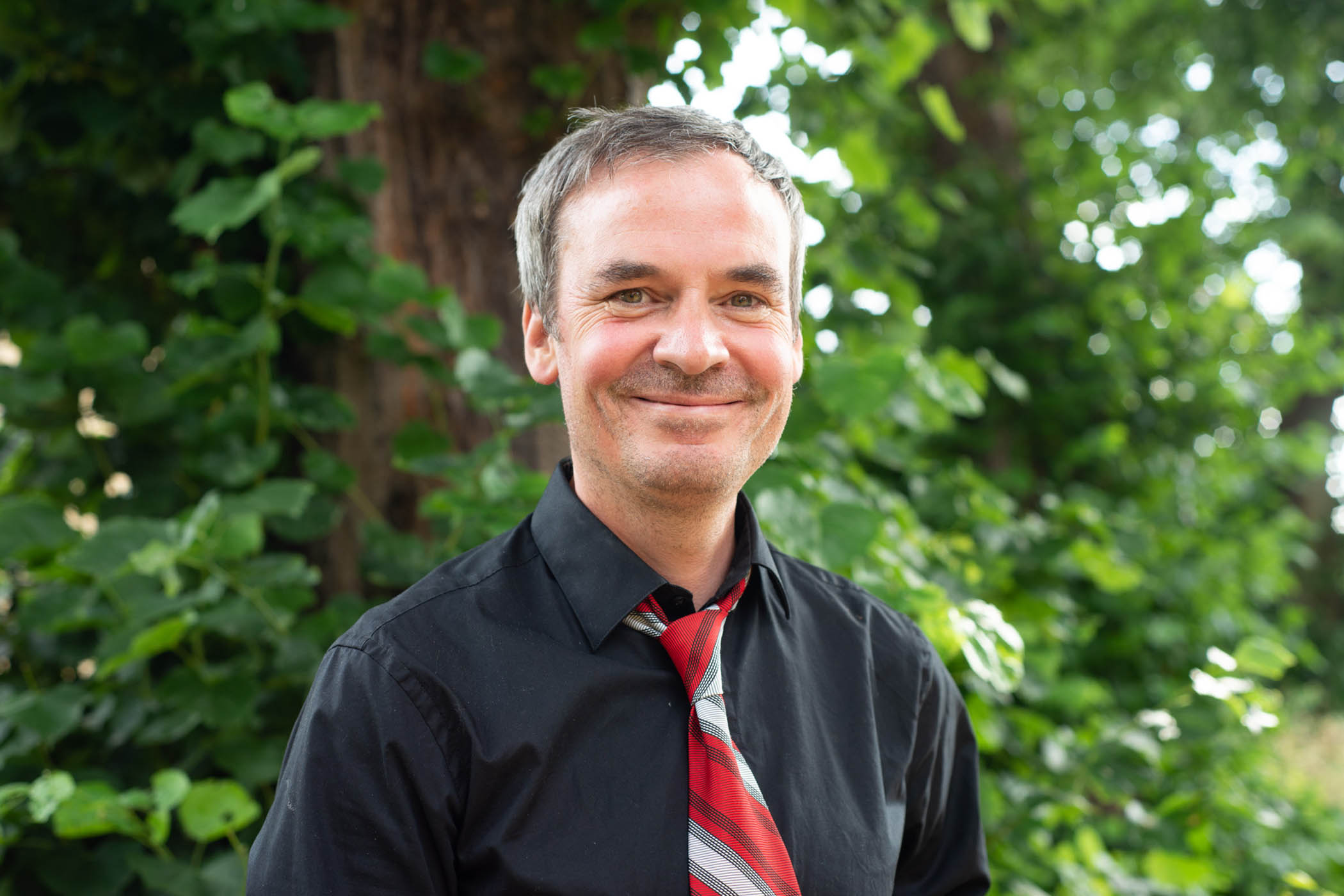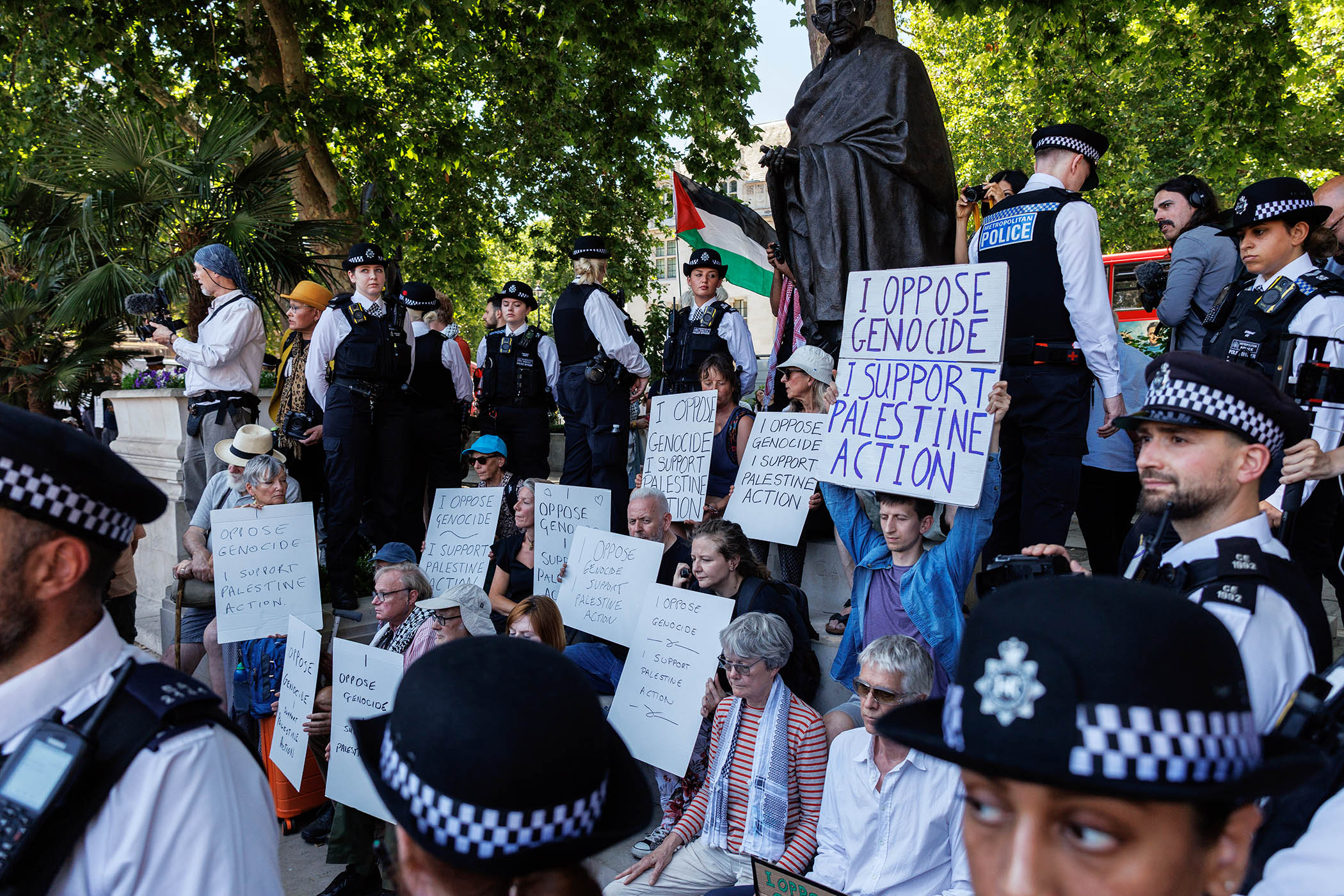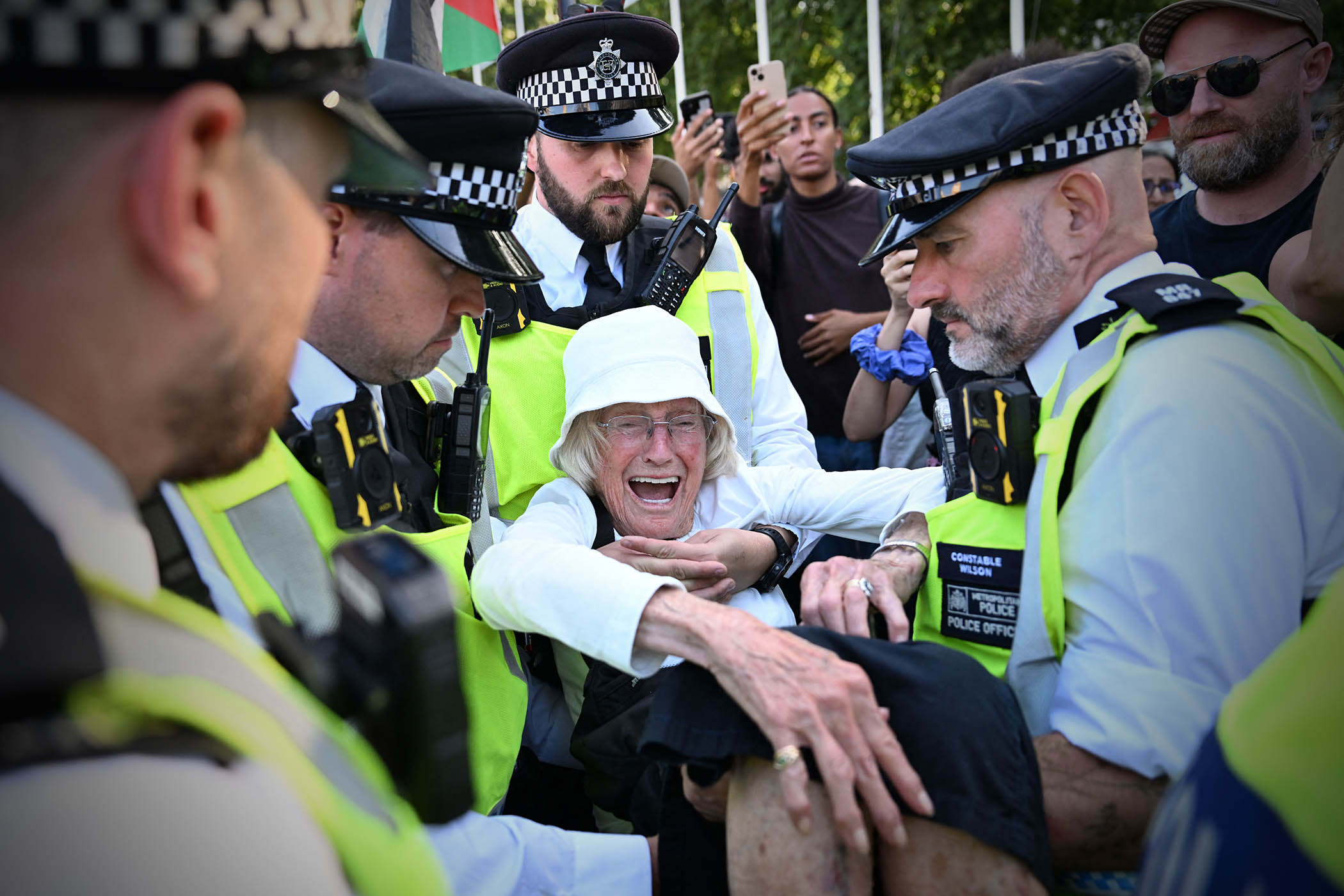Shortly after dawn on 29 July 2023, Sam Griffiths, then 48, walked into an oil refinery in Grangemouth, Falkirk, with 19 other members of the climate activist group This Is Rigged. Griffiths, a graphic designer from London, was used to signing petitions and writing to his MP – but he had never done anything like this. He was both determined and “very scared”.
Together with another activist, Griffiths scaled a gate and attached himself to the factory’s pipework using a padlock. The fuel-dispensing pumps immediately shut down. They remained so for almost 12 hours until the pair were removed by police.
“I have a son I want to be able to look in the eye when I tell him I love him,” Griffiths wrote to me from HMP Polmont in April, explaining his motivation for taking direct action against Scotland’s last remaining oil refinery. “He is my lens for caring about the world.”
In March this year, Griffiths was sentenced to 16 months in prison for reckless and culpable conduct – the first time Scotland had imprisoned an environmental activist for non-violent direct action. Between 1932 and 2018, it was almost unheard of for environmental activists to be sentenced to prison. Since 2018, an estimated 120 have been locked up. This shift does not only relate to climate protest: 33 pro-Palestine protesters are on remand.
For months I have been corresponding with these individuals from their prison cells. Their letters are full of defiance, fear and anger. “It’s not a crime to want to pass on a better world,” wrote Indigo Rumbelow, 31, from Just Stop Oil. Charlotte Head, 29, from Palestine Action, wrote: “Losing my liberty has been like entering a purgatory where you are drowning, but never die.”
The letter-writers share one core belief: that dissent is being silenced in the UK. It is a view shared by Michel Forst, UN special rapporteur on environmental defenders, who describes the UK as “clearly the worst country in Europe in terms of judicial response to climate activism, and more broadly to the rest of protest”.
How have we ended up here?
On 20 June, four members of Palestine Action, a UK-based campaign group, broke into RAF Brize Norton, in Oxfordshire, and caused damage to two aircraft. Palestine Action claimed it had “directly intervened in the genocide” because Britain continued to “send military cargo [to Israel], fly spy planes over Gaza, and refuel US/Israeli fighter jets”. Keir Starmer saw it differently. “The act of vandalism committed at RAF Brize Norton is disgraceful,” he wrote on X.

Sam Griffiths was sentenced to 16 months in prison for a direct action protest at an oil refinery in Falkirk
Two weeks later Palestine Action was proscribed as a terrorist organisation, joining or supporting it punishable by up to 14 years in prison. The government’s own Proscription Review Group, a Home Office body responsible for reviewing the list of banned terrorist organisations said the move would be “novel and unprecedented”.
Yet in 2003 Starmer, then a human rights lawyer, was part of a team defending n almost identical case to Brize Norton. On the eve of the Iraq war, five people were charged with planning to disable planes at RAF Fairford, Gloucestershire, in Gloucestershire. Their lawyers concocted a novel defence: the Fairford Five were justified in their actions because they were preventing greater harm. Starmer argued the case at the court of appeal and, later, at the House of Lords, and while the defendants were ultimately not acquitted, it produced a pivotal judgment by Lord Hoffmann.
Newsletters
Choose the newsletters you want to receive
View more
For information about how The Observer protects your data, read our Privacy Policy
“Civil disobedience on conscientious grounds has a long and honourable history in this country,” Hoffmann wrote, referencing the legacy of the suffragettes. “It is the mark of a civilised community that it can accommodate protests and demonstrations of this kind.” Protesters were expected to behave “with a sense of proportion”, the police and prosecutors “with restraint”, and magistrates would “impose sentences which take the conscientious motives of the protesters into account”. Hoffmann’s dicta became a touchstone. “Everyone used to go to court. We’d say that’s what the supreme court says, and we used to get our conditional discharges, or occasionally a fine,” says Raj Chada, a criminal lawyer who has represented hundreds of protesters over two decades.
In 2009 I was one of a group who used that same defence, arguing that our intention in shutting down Ratcliffe-on-Soar coal-fired power station was to mitigate the greater harm of climate change. We were found guilty, yet when the ruling was declared unsafe due to the mishandling of evidence gathered by the undercover officer Mark Kennedy, it was Starmer, by then director of public prosecutions, who invited us to appeal. Our convictions were quashed.
Chada first noticed a shift in 2019 in how protesters were being dealt with. High-profile environmental direct action, with a few individuals shutting down a power station or stopping a coal train, had been going on for decades, but that year Extinction Rebellion (XR) took to the streets in London in their thousands. Public support for XR’s tactics plummeted after activists targeted tube trains at rush hour.
“If I was in government, I would want to know why 5,000 people were willing to go to court and get a criminal conviction. I would wonder whether something was awry in the population,” says Chada. “Instead, they chose a law enforcement option.”
Thousands of XR protesters were arrested, as they had intended. What was new was the judiciary pressing charges on so many of them. Of 250 or so convictions, most received conditional discharges and fines. But one of Chada’s clients,James Brown, a former Paralympian who glued himself to a plane, received a 12-month sentence. “That, certainly for me, was the first time that somebody went to prison as a result of a peaceful protest,” says Chada.
“If I was in government, I would want to know why 5,000 people were willing to go to court and get a criminal conviction”
“If I was in government, I would want to know why 5,000 people were willing to go to court and get a criminal conviction”
Raj Chada, criminal lawyer
In 2022, the Police, Crime, Sentencing and Courts (PCSC) act, brought in under the Conservatives, expanded police powers to pre-emptively restrict protest, criminalised certain disruptive tactics and created a new public nuisance offence carrying a maximum sentence of 10 years. The Public Order Act 2023 created new offences such as “locking on” (attaching oneself to something to cause serious disruption), interfering with infrastructure and enhanced stop-and-search powers at protests.
In 2021, when the PCSC bill was before parliament, Joanna Gilmore, a senior lecturer in law at the University of York, initiated an open letter criticising an “alarming extension of state control”. The letter was signed by more than 1,000 legal academics, in what Gilmore called “the strongest response I have seen in my career”.
In opposition, Labour branded parts of the bill “outrageous”, but since coming into power has done nothing to amend either act.
Two weeks after Labour was elected, in July 2024, five members of Just Stop Oil were sentenced to four and five years in prison for conspiring to disrupt traffic, the longest sentences yet for peaceful protest in the UK. Typically, protesters have been permitted to explain their motivations in court to justify their actions and mitigate their sentences, as per Hoffmann’s dicta, but here the judge instructed the jury to disregard the defendants’ philosophical and political beliefs – part of a growing trend.
Forst, the special rapporteur, was in court, and describes that decision as “difficult to understand”. Eleven members of Defend Our Juries, an activist group set up in 2020 to bring attention to a juror’s right to acquit a defendant according to their conscience, were arrested outside court for perverting the course of justice, in protest at the judge’s decision. All charges were later dropped.
Forst’s role is to ensure compliance with the Aarhus convention, one of several frameworks ratified by the UK, along with the European convention on human rights and the international covenant on civil and political rights, that protect the right to protest. At the time, Forst called the convictions “a dark day for peaceful environmental protest ... and indeed for anyone concerned with the exercise of their fundamental freedoms in the United Kingdom”. Yet the government has repeatedly told him that his mandate is irrelevant. “They simply challenge the fact that I’m taking those climate activists as environmental defenders,” he says.
In other words, the government refuses to accept that these people are acting from conscience: instead, they are criminals, pure and simple.
Charlotte Head was charged in connection with a direct action targeting the UK facility of Elbit Systems, Israel’s largest private arms manufacturer, in August 2024. The Filton 18 (a number that has since risen to 24, following more arrests) have been held on remand for more than a year, despite it being a first offence for many.
Aged 20, Head spent three years working in the refugee camps in Calais. The war in Palestine brought to mind the people she had met in the French camps, and stirred her to action. “If it’s wrong to want to prevent pain and death and destruction, then I don’t wish to be ‘right’,” she wrote to me from HMP Foston Hall. She hopes the treatment of the Filton 18 has focused attention on how we have lost our right to “free thought and speech and empathy”.
“If it’s wrong to want to prevent pain and death and destruction, then I don’t wish to be ‘right’”
“If it’s wrong to want to prevent pain and death and destruction, then I don’t wish to be ‘right’”
Charlotte Head, Palestine Action
Most correspondents acted knowing that prison was possible, and say that the threat of sentences would not have dissuaded them. Indeed, more than 2,000 people have been arrested for supporting Palestine Action since its proscription. But many did not anticipate getting sentences this harsh.
I have corresponded with those separated from their children; who have flunked university; who have lost jobs and relationships because of decisions they have made. Some have since been released, often with stringent bail conditions: wearing tags, subject to curfews, and banned from associating with other activists. Certain imposed restrictions, such as a ban on attending meetings or gatherings, are meant to be restricted for extremist cases.
“It’s scary being this young and engaging with what the science is saying,” wrote one climate protester, whose bail conditions forbid them from speaking to the press. “With a community you can get up every day and keep going.”
Daniel Shaw, 39, a former social worker, was one of the Just Stop Oil activists convicted last year. We spoke after his release. His sentence was reduced on appeal and he served more than 11 months before being let out on licence. It was the third time he had been inside.
“If you do really want to change the world, you have to be prepared to make sacrifices,” he says. “The government’s response has almost made it that way. It’s become a real battle. And you’re not going to enter into that battle unless you’re prepared to accept certain consequences.”
Kamran Ahmed, another of the Filton 18, sent me a verse from the Qur’an: “Stand out firmly for justice, as witnesses to Allah, even though it be against yourselves, or your parents, or your kin.” On 10 November, Ahmed joined five other imprisoned pro-Palestine protesters on hunger strike with five demands, including immediate bail and a right to a fair trial.
But alongside the impact on the individual is a broader concern about what is at stake when the right to protest is eroded.
The UK remains an outlier, arresting climate and environmental protesters at three times the average global rate, according to recent research by the University of Bristol. Neal Lawson, a member of the Labour party for more than 40 years and co-founder of Compass, a progressive thinktank promoting cross-party reform, sees little difference between the former Conservative position and that of the government.
“They’re control freaks,” he says. “They’re people who see the whole of politics through the lens of the state. They’ll pay lip service to the past in terms of trade union struggle, and, ironically, things like the suffragettes. “But in reality they think that all change happens via them, as the supreme technocrats. Plus they get law and order brownie points for smashing down on these people.” While the majority of the British public support protest in theory, they do not condone disruptive actions and have no problem with how they are being policed. Labour is treading a delicate line, gambling with public tolerance for state repression, along with the great expense and additional burden on a criminal justice system already stretched to its limit.
The government is considering further amendments to the Public Order Act that could ban certain disruptive protests altogether, and would allow police to consider protests’ “cumulative impact”. Starmer has mooted criminalising certain chants.
When asked to explain Starmer’s change of heart, Lawson is as nonplussed as everyone else. “Is he the McLibel Starmer?” he says, referencing a case from 1997 where he defended two activists against McDonald’s, pro bono. “Or is he the Starmer who’s dragging grannies into prison cells for protesting genocide? You can work that out for yourself.”
A Home Office spokesperson said: “The right to protest is fundamental to our democracy. People in this country will always be able to freely express their views. However, there is a balance of rights – and the right to protest is not a right to intimidate or sow fear.”
Yet there are plenty who feel the government is getting that balance wrong. Michael O’Flaherty, Europe’s most senior human rights official, expressed his concerns in a recent letter to Shabana Mahmood, the home secretary, calling for a review into UK protest laws. “International human rights standards are clear,” he says. “A certain level of inconvenience must be tolerated in a functioning democracy. Authorities should take necessary measures to protect the rights of everyone involved in assemblies; this is the very essence of democratic debate.”
“We’d be lying to ourselves if we said that this legislation hadn’t been effective in subduing protest,” Shaw says.
But it is clear to me from the letters I’ve received that protest is not going to go away. There is just too much at stake.
“Taking action with Just Stop Oil and This Is Rigged has completely changed my life,” wrote Griffiths. “I have much less money, comfort and I have now lost my liberty. But I have gained my life’s purpose, a deep connection to meaning, and connection to a community that sustains me. In spite of being locked up I have never felt more personal autonomy or freedom. This was my choice.”
Adam Weymouth is a writer and former activist. His latest book, Lone Wolf, was shortlisted for the 2025 Baillie Gifford prize.
Photographs by Dan Kitwood/Getty Images


